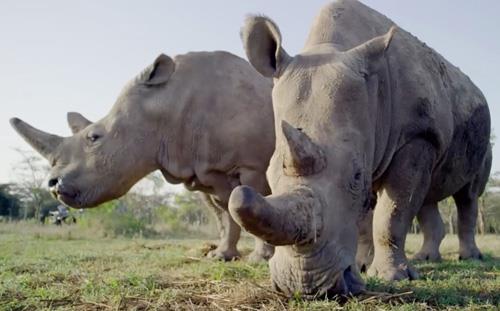
The only thing more ominous and depressing than a PBS program titled Extinction is its content.
Extinction: The Facts airs at 8 p.m. ET Wednesday on PBS (check local listings), and while its warnings are familiar, their urgency doesn't get any less chilling with repetition.
Narrated by long-time nature journalist David Attenborough, Extinction essentially warns that if the human residents of the planet don't get our ecological act together fast, we could lose a million species over a handful of years.
For those of you keeping score, that includes about half a million plant species and the same number of animal and insect species.
The most poignant specific example is the Northern White Rhino, whose fate, sadly, is already sealed. There remain only two Northern White Rhinos, a 30-year-old mother and her 19-year-old daughter. With no living males, the daughter will one day be the last of her kind.
But species extinction isn't just a matter of "gee, that's too bad" that we will no longer see larger fascinating animals like the Northern White Rhino or small cute animals like the pangolin, which is being poached toward extinction because con artists have convinced a large number of people their scales have medicinal value, which is a lie.
No, multiple experts point out here, species extinction affects our lives much more directly.
Insect extinction, for example, which probably pops up on almost no one's radar as a major concern, disrupts the food chain at its starting point. It also has a dire effect on pollination since insects pollinate some 70% of world food crops.
A little higher up the food chain, the experts here trace our recent explosion in dangerous viral diseases – HIV, SARS, Ebola, swine flu, and, yup, COVID-19 – to increased human interaction with wild animals and, therefore, the viruses they harbor.
Whatever price we humans pay, however, the animals pay an even higher one. When humans push into previously wild territory, which we do relentlessly as the human population triples within many of our lifetimes, it almost never ends well for the previous inhabitants.
They lose their homeland to deforestation and the expansion of agriculture, primarily meaning new cattle ranches. They lose the quality of the remaining land to the degradation of human-generated pollution. Throw in climate change, another legacy primarily of humans, and that's why a million species could be forced out of business.
Attenborough and others here note that none of these warnings should come as any surprise. For more than a half-century, there has been a serious environmental movement sounding this alarm to anyone who will listen.
There has been some governmental and political response. Too much has been lip service, however, and there remain powerful forces, in government and industry, who find it more convenient and profitable to either deny there's a problem or do nothing about it.
That's the depressing part of Extinction: The Facts. While an international statement like the Paris Agreement reflects at least an awareness of environmental crises, so far, we only have starting points toward serious rethinking of how our species does business.
Some of the experts here express the optimistic hope that the economic "pause" imposed on much of the world by the COVID pandemic will become a point at which we can rethink how we treat the environment.
Perhaps, in this optimistic view, we will find a way to create progress and economic health in a way that doesn't destroy the biodiversity of the planet. That model, these experts all agree, is entirely feasible. It just requires the will to undertake some fundamental restructuring.
There are little signs everywhere that this could be occurring. It's harder to find more significant signs that it's happening on anything like the scale that will be necessary to halt or reverse many of the destructive practices already in place, from widespread poaching of endangered wildlife to the bulldozing of the rainforests.
Closer to home, perhaps, this restructuring would also require a reassessment of the exploding consumerism in richer, more developed countries. That demand exacerbates both pollution and some of the most lethal practices in the less developed world.
Attenborough and company don't leave us without hope. But it's a fragile one and Extinction: The Facts leaves little doubt that we're still unraveling when we should be repairing.
Because at some point, we just run out of planet.